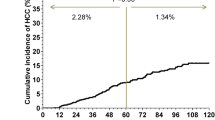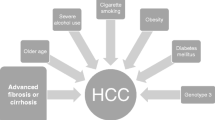Abstract
Background
Due to advances in interferon (IFN) therapy for chronic hepatitis C, most elderly patients, and even many of those with advanced hepatic fibrosis, now achieve a sustained virological response (SVR). However, carcinogenesis remains problematic in these patients. Hence, we aimed to elucidate risk factors for hepatocarcinogenesis in SVR patients and to present an appropriate follow-up protocol for improving outcomes.
Methods
We retrospectively studied 562 consecutive SVR patients for a median observation period of 4.8 years.
Results
Hepatocellular carcinoma was diagnosed in 31 patients (5.5 %). Respective cumulative incidences were 3.1, 10.1, and 15.9 % at 5, 10, and 15 years after completion of IFN therapy. The proportional hazards model identified moderate or advanced fibrosis stage, advanced age, habitual alcohol consumption, and alpha-fetoprotein elevation as determinants of carcinogenesis, with hazard ratios of 10.7 (p < 0.001), 4.1 (p < 0.01), 3.9 (p < 0.01), and 2.6 (p < 0.05), respectively. Carcinoma was diagnosed in 26 % of patients more than 10 years after completion of IFN therapy. Unexpectedly, F2 fibrosis was detected in 42 % of these patients. The 5-year survival rate was 93 % in the patients who had received periodic cancer screening but only 60 % in those who had not.
Conclusion
We recommend that SVR patients be observed at 6-month intervals, at a minimum, to facilitate diagnosis at an early stage, for as long as possible after completion of therapy even if not at an advanced stage of fibrosis.




Similar content being viewed by others
Abbreviations
- HCV:
-
Hepatitis C virus
- HCC:
-
Hepatocellular carcinoma
- IFN:
-
Interferon
- ALT:
-
Alanine aminotransferase
- SVR:
-
Sustained virological response
- PEG-IFN:
-
Pegylated interferon
- CHC:
-
Chronic hepatitis C
- AFP:
-
Alpha-fetoprotein
- PIVKA-II:
-
Protein induced by vitamin K absence or vitamin K antagonist-II
- US:
-
Ultrasonography
- CT:
-
Computed tomography
- MR:
-
Magnetic resonance imaging
- γGTP:
-
γGlutamyl transpeptidase
- HBV:
-
Hepatitis B virus
References
Uemura T, Ichijo T, Yoshizawa K, et al. Epidemiology of hepatocellular carcinoma in Japan. J Gastroenterol. 2009;44(suppl 19):102–7.
Nishiguchi S, Kuroki T, Nakatani S, et al. Randomized trial of effects of interferon-alpha on incidence of hepatocellular carcinoma in chronic active hepatitis C with cirrhosis. Lancet. 1995;346:1051–5.
Yoshida H, Shiratori Y, Moriyama M, et al. Interferon therapy reduces the risk for hepatocellular carcinoma: national surveillance program of cirrhotic and noncirrhotic patients with chronic hepatitis C in Japan. IHIT study group. Inhibition of hepatocarcinogenesis by interferon therapy. Ann Intern Med. 1999;131:174–81.
Ikeda K, Saitoh S, Arase Y, et al. Effect of interferon therapy on hepatocellular carcinogenesis in patients with chronic hepatitis type C: a long-term observation study of 1643 patients using statistical bias correction with proportional hazard analysis. Hepatology. 1999;29:1124–30.
Marcellin P, Boyer N, Gervais A, et al. Long-term histologic improvement and loss of detectable intrahepatic HCV RNA in patients with chronic hepatitis C and sustained response to interferon-alpha therapy. Ann Intern Med. 1997;127:875–81.
Okanoue T, Itoh Y, Minami M, et al. Interferon therapy lowers the rate of progression to hepatocellular carcinoma in chronic hepatitis C but not significantly in an advanced stage: a retrospective study in 1148 patients. J Hepatol. 1999;30:653–9.
Nishiguchi S, Shiomi S, Nakatani S, et al. Prevention of hepatocellular carcinoma in patients with chronic active hepatitis C and cirrhosis. Lancet. 2001;357:196–7.
Cardoso AC, Moucari R, Figueiredo-Mendes C, et al. Impact of peginterferon and ribavirin therapy on hepatocellular carcinoma: incidence and survival in hepatitis C with advanced fibrosis. J Hepatol. 2010;52:652–7.
Toyoda H, Kumada T, Tokuda A, et al. Long-term follow-up of sustained responders to interferon therapy in patients with chronic hepatitis C. J Viral Hepat. 2000;7:414–9.
Enokimura N, Shiraki K, Kawakita T, et al. Hepatocellular carcinoma development in sustained viral responders to interferon therapy in patients with chronic hepatitis C. Anticancer Res. 2003;23:593–6.
Ikeda M, Fujiyama S, Tanaka M, et al. Risk factors for development of hepatocellular carcinoma in patients with chronic hepatitis C after sustained response to interferon. J Gastroenterol. 2005;40:148–56.
Tokita H, Fukui H, Tanaka A, et al. Risk factors for the development of hepatocellular carcinoma among patients with chronic hepatitis C who achieved a sustained virological response to interferon therapy. J Gastroenterol Hepatol. 2005;20:752–8.
Kobayashi S, Takeda T, Enomoto M, et al. Development of hepatocellular carcinoma in patients with chronic hepatitis C who had a sustained virological response to interferon therapy: a multicenter, retrospective cohort study of 1124 patients. Liver Int. 2007;27:186–91.
Hirakawa M, Ikeda K, Arase Y, et al. Hepatocarcinogenesis following HCV RNA eradication by interferon in chronic hepatitis patients. Intern Med. 2008;47:1637–43.
Chang KC, Hung CH, Lu SN, et al. A novel predictive score for hepatocellular carcinoma development in patients with chronic hepatitis C after sustained response to pegylated interferon and ribavirin combination therapy. J Antimicrob Chemother. 2012;67:2766–72.
Ito Y, Yamamoto N, Nakata R, et al. Delayed development of hepatocellular carcinoma during long-term follow-up after eradication of hepatitis C virus by interferon therapy. World J Gastroenterol. 2005;11:7218–21.
Mashitani T, Yoshiji H, Yamazaki M, et al. Development of hepatocellular carcinoma in a patient 13 years after sustained virological response to interferon against chronic hepatitis C: a case report. Cases J. 2009;2:18.
Conteduca V, Sansonno D, Russi S, et al. Therapy of chronic hepatitis C virus infection in the era of direct-acting and host-targeting antiviral agents. J Infect. 2013. doi:10.1016/j.jinf.2013.08.019.
Jacobson IM, McHutchison JG, Dusheiko G, et al. Telaprevir for previously untreated chronic hepatitis C virus infection. N Engl J Med. 2011;364:2405–16.
Fried MW, Buti M, Dore GJ, et al. Once-daily simeprevir (TMC435) with pegylated interferon and ribavirin in treatment-naïve genotype 1 hepatitis C: The randomized PILLAR study. Hepatology. 2013;58:1918–29.
Zeuzem S, Hultcrantz R, Bourliere M, et al. Peginterferon alfa-2b plus ribavirin for treatment of chronic hepatitis C in previously untreated patients infected with HCV genotype 2 or 3. J Hepatol. 2004;40:993–9.
Urquijo JJ, Diago M, Boadas J, et al. Safety and efficacy of treatment with pegylated interferon alpha-2a with ribavirin in chronic hepatitis C genotype 4. Ann Hepatol. 2013;12(1):30–5.
Desmet VJ, Gerber M, Hoofnagle JH, et al. Classification of chronic hepatitis: diagnosis, grading, and staging. Hepatology. 1994;19:1513–20.
Llovet JM, Fuster J, Bruix J, Barcelona-Clinic Liver Cancer Group. The Barcelona approach: diagnosis, staging, and treatment of hepatocellular carcinoma. Liver Transpl. 2004;10(2 suppl 1):S115–20.
Morgan RL, Baack B, Smith BD, et al. Eradication of hepatitis C virus infection and the development of hepatocellular carcinoma: a meta-analysis of observational studies. Ann Intern Med. 2013;158:329–37.
Colombo M. Natural history and pathogenesis of hepatitis C virus-related hepatocellular carcinoma. J Hepatol. 1999;31:25–30.
Ikeda K, Saitoh S, Suzuki Y, et al. Disease progression and hepatocellular carcinogenesis in patients with chronic viral hepatitis: a prospective observation of 2215 patients. J Hepatol. 1998;28:930–8.
Khan KN, Yatsuhashi H. Effect of alcohol consumption on the progression of hepatitis C virus infection and risk of hepatocellular carcinoma in Japanese patients. Alcohol. 2000;35:286–95.
Tateyama M, Yatsuhashi H, Taura N, et al. Alpha-fetoprotein above normal levels as a risk factor for the development of hepatocellular carcinoma in patients infected with hepatitis C virus. J Gastroenterol. 2011;46:92–100.
Sangiovanni A, Colombo E, Radaelli F, et al. Hepatocyte proliferation and risk of hepatocellular carcinoma in cirrhotic patients. Am J Gastroenterol. 2001;96:1575–80.
Taura N, Fukuda S, Ichikawa T, et al. Relationship of α-fetoprotein levels and development of hepatocellular carcinoma in hepatitis C patients with liver cirrhosis. Exp Ther Med. 2012;4:972–6.
Hung CH, Lee CM, Wang JH, et al. Impact of diabetes mellitus on incidence of hepatocellular carcinoma in chronic hepatitis C patients treated with interferon-based antiviral therapy. Int J Cancer. 2011;128:2344–52.
Khattab MA, Eslam M, Mousa YI, et al. Association between metabolic abnormalities and hepatitis C-related hepatocellular carcinoma. Ann Hepatol. 2012;11:487–94.
Hamada H, Yatsuhashi H, Yano K, et al. Impact of aging on the development of hepatocellular carcinoma in patients with posttransfusion chronic hepatitis C. Cancer. 2002;95:331–9.
Ohishi W, Kitamoto M, Aikata H, et al. Impact of aging on the development of hepatocellular carcinoma in patients with hepatitis C virus infection in Japan. Scand J Gastroenterol. 2003;8:894–900.
Tanaka Y, Hanada K, Mizokami M, et al. A comparison of the molecular clock of hepatitis C virus in the United States and Japan predicts that hepatocellular carcinoma incidence in the United States will increase over the next two decades. Proc Natl Acad Sci U S A. 2002;99:15584–9.
Miki D, Aikata H, Uka K, et al. Clinicopathological features of elderly patients with hepatitis C virus-related hepatocellular carcinoma. J Gastroenterol. 2008;43:550–7.
Honda T, Miyaaki H, Ichikawa T, et al. Clinical characteristics of hepatocellular carcinoma in elderly patients. Oncol Lett. 2011;2:851–4.
Singh P, Coskun ZZ, Goode C, et al. Lymphoid neogenesis and immune infiltration in aged liver. Hepatology. 2008;47:1680–90.
Conflict of interest
The authors declare that they have no conflict of interest.
Author information
Authors and Affiliations
Corresponding author
Rights and permissions
About this article
Cite this article
Yamashita, N., Ohho, A., Yamasaki, A. et al. Hepatocarcinogenesis in chronic hepatitis C patients achieving a sustained virological response to interferon: significance of lifelong periodic cancer screening for improving outcomes. J Gastroenterol 49, 1504–1513 (2014). https://doi.org/10.1007/s00535-013-0921-z
Received:
Accepted:
Published:
Issue Date:
DOI: https://doi.org/10.1007/s00535-013-0921-z




